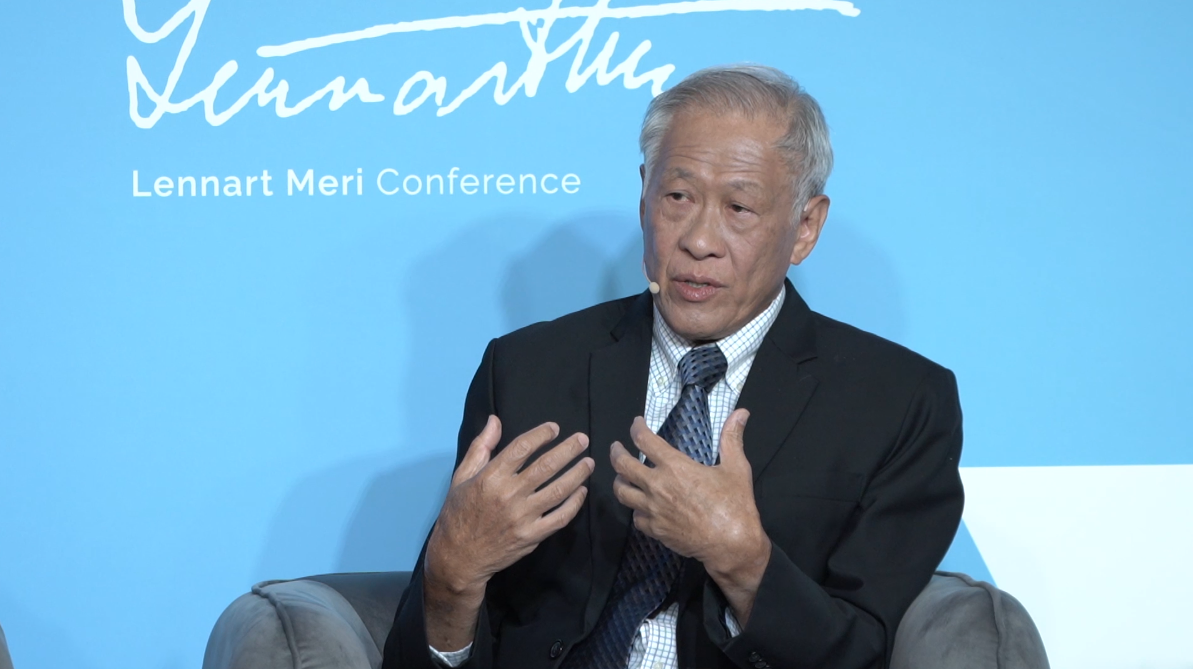Small states are primarily concerned with stability and international rules: Ng Eng Hen
Sign up now: Get ST's newsletters delivered to your inbox

Dr Ng Eng Hen was one of four panellists at a discussion on China at the annual Lennart Meri Conference in Estonia.
PHOTO: SCREENGRAB FROM MINDEF VIDEO
SINGAPORE - Stability is the primary concern for small countries like Singapore which also champion the importance of international rules that protect the interests of all nations, no matter their size, said Defence Minister Ng Eng Hen on Sunday (May 15).
He acknowledged that small states cannot determine the rules of the world. Even so, there have been times - including when Russia invaded Ukraine - that Singapore has spoken out to preserve the existing global order, Dr Ng said.
"Singapore's recent actions underscore our strongest commitment to the preservation of sovereignty, political independence and territorial integrity, which we believe is a fundamental bedrock for a free and stable world order, and smaller countries' right to survive and thrive," he added.
It is in this light that Singapore relates to movements on the international stage, including the rise of China and its strategic competition with the United States.
Dr Ng was one of four panellists at a discussion on China at the annual Lennart Meri Conference in Estonia.
The security and foreign policy conference, which was first organised in 2007, brings together policymakers and analysts from around the world.
The wide-ranging discussion took in speakers' thoughts on China's ambitions and plans, as well as how its actions should be understood in the light of the Russian invasion of Ukraine.
They also spoke of Sino-US competition, the upcoming Quadrilateral Security Dialogue summit, and how these might impact the international order.
The other three speakers represented the perspectives of the US, India and Australia. They were: Ms Bonnie Glaser, director of the Asia Programme at the German Marshall Fund, Professor C. Raja Mohan, a senior fellow at the Asia Society Policy Institute and Ms Natasha Kassam, director of the Lowy Institute's public opinion and foreign policy programme.
On China, Dr Ng noted that the superpower has reiterated its fundamental support for sovereignty and territorial integrity, and has pledged to uphold the legitimate rights and interests of small and medium-sized countries.
Even so, risks remain - chiefly, a potential decoupling between China and the US. Such a bifurcated global system would have disastrous consequences for the world, he said.
"We are too connected, and such a choice, if it had to be made, will impoverish countries and imperil global security."
Singapore believes that the US will remain the world's largest economy and global military power, Dr Ng added.
But he pointed out that China is now the largest trading partner of all Asian countries, and the European Union's largest trading partner in goods.
The strategic rivalry between both countries is thus "the most significant event of our lifetimes", he said.
"The challenge for both the US and China leadership is to demonstrate statesmanship, to rise above domestic concerns to forge a stronger, more sustainable and equitable global system," Dr Ng added.
"I do not think there is a certainty of that hopeful outcome, but I think our futures and collective well-being depend very much on it."
One audience member asked about Quad members' expectations for the next leaders' summit, which is slated to take place in Tokyo next week. He also asked Dr Ng about how the four-member grouping between Australia, India, Japan and the US is viewed in South-east Asia.
Ms Glaser responded that it is important for the focus to remain on the provision of public goods in the region.
"But it is, of course, not true to say that there is no security component to the Quad. I think we will see that grow a bit in this upcoming meeting."
Dr Ng said he could not speak for the rest of Asean. But he offered a reminder from Singapore's perspective: If such alliances are focused on any one country, such as China, there is an increased risk of bifurcation in the global system.
"Is there a risk that these security alliances can be focused on anti-China?" he said. "I think, theoretically, yes. As it is, I think these are decisions that leaders in the various countries have done, and we will have to see how they progress."


